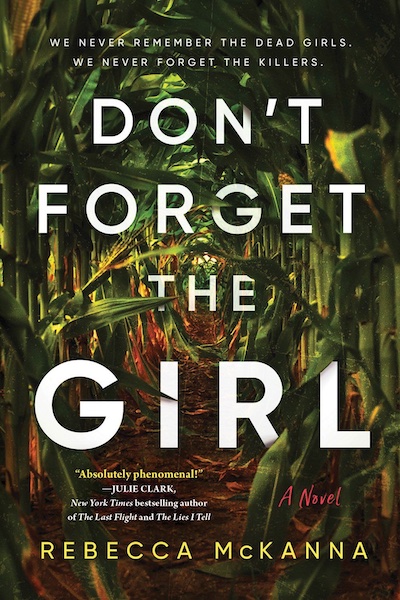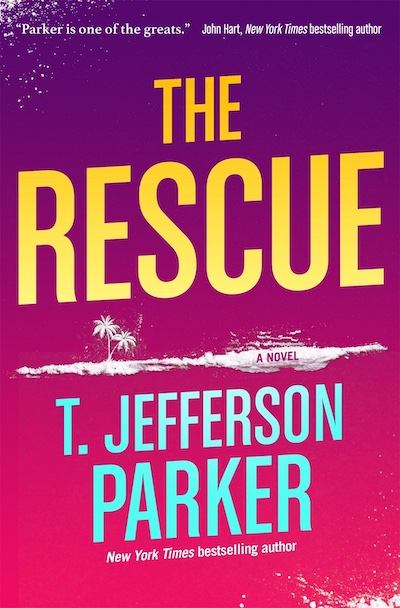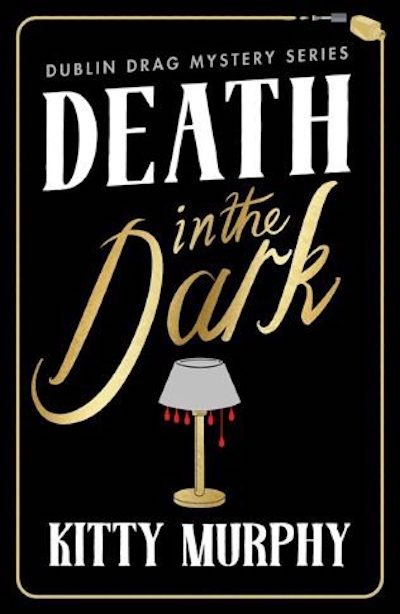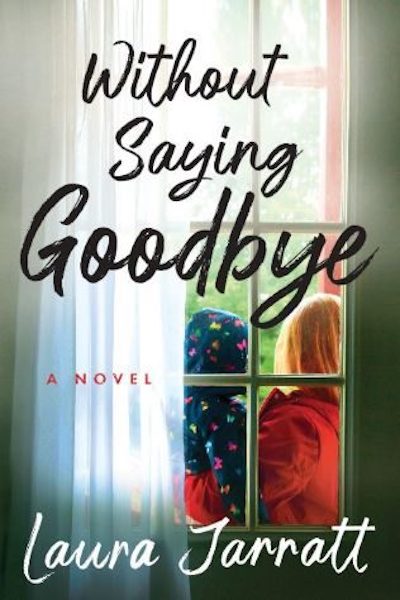First, there were three. Now only two women are left, estranged but still desperate to know what happened to their college friend Abby, who disappeared years ago. They might never know, as serial killer Jon Allan Blue, who killed other young women in the area around the same time, is about to be put to death. The two remaining friends can’t be more different. Bree is a college professor who’s having an affair with an underage student, which sets in relief the unending turmoil caused by Abby’s death. Chelsea is an Episcopal priest whose collar and steadfast demeanor hide an inner longing to break out of her marriage to a man who “looks like a photo of himself that [has] been left too long in the sun.” The two must interact again when a true-crime podcast covers Blue’s killings. The producer tries to convince Bree and Chelsea that their friend’s case deserves to be investigated, but with the show breathlessly feeding the media frenzy with comments like, “Friends don’t let friends get murdered” and Blue himself relishing the spotlight, participation seems counterproductive, not to mention tacky. While Abby’s fate is debated, we flash back to the three friend’s lives in the run up to her disappearance. This and the carefully posed exposé of podcast politics will leave readers looking differently at the spectacle that is the true-crime world, especially when it comes to women victims.
Review
A supernatural mystery—part Stranger Things, part Enola Homes, but very much itself—set in 1909 Boston. Young Artie Quick, a Filene’s basement “shopgirl” by day, is fascinated by criminal behavior and signs up to study Criminal Investigation at the YMCA’s Evening Institute for Men. One problem? Artie is a young woman, and to pass, she has to adopt male drag and attempt to alter her voice. While she still lives with her working-class family, most of her time she’s at well-off Theodore’s digs—her charming if awkward best friend. Theodore is as obsessed with magic as Artie is with crime, and the two take on a case: the investigation into unnatural screams heard at night in the Boston Common by homeless men and petty criminals. What seems like a minor quest ends up taking the two on a sojourn that reveals the abduction of young women, a cover-up by city officials, and the existence of a spirit underneath the city, ready to wield even greater destruction. This book is way, way over the top—and is sure to delight its intended audience. Artie grows to love her menswear, and seems to love women as well, and her embrace of her queerness is just one of the many transformations in the book. For young adults on up.
“The only way to survive a whirlpool is to let yourself be dragged along by it,” realizes Evelyn, the confused daughter of an accused murderer. The murderer, Hugo Lamadrid, has been missing since a Buenos Aires train crash killed and maimed scores of passengers. Readers know that Hugo escaped the wreckage, where bodies are “piled up, jumbled together, crushed against the walls of the carriage, spilling out the window, dislocated, broken, busted.” But the police don’t know and have just been to his house about the murder. What the authorities do know is that Evelyn and her mother, Marta, suddenly and mysteriously got the urge to leave town after the police’s visit, and now the national media is fixed on the shrine they’ve set up at the home of Marta’s sister that begs the wounds “ofourlordjesuschrist” to help find poor, hapless Hugo alive on the train. A whirlpool indeed, in a book whose baroque abundance of language, strange observations, and even stranger ending are memorable and striking. For those who loved Julie Otsuka’s The Buddha in the Attic.
Growing up, Luke Tremblay loved being sent off to spend his summers with family on a small hamlet on Vancouver Island. Until high school hit and his parents learned he was gay and disowned him. Even his beloved Aunt Marguerite, a full-time island resident, refused to see him. So decades later, when his aunt dies and leaves Luke her estate, including a charming cottage and antique business, it’s a shock. He returns to the island with one goal: sell the properties and get back to Toronto. But when he’s attacked at the cottage by a seemingly random guy, who’s making crazy claims about his aunt, and when that guy is discovered the next morning dead in the garden, Luke can’t help but get pulled deeper into island life. Thanks also go to the Mountie, Sergeant Munro, aka Officer Beefcake, who, wouldn’t you know, was a childhood friend of Luke’s and still harbors a grudge for Luke disappearing all those years ago. There’s plenty to enjoy in this qouzy, from a budding romance to more crimes that need unearthing. And while Luke may not be the most charming of protagonists—he’s just a wee bit bitchy and somewhat of a snob—he’s certainly realistic. For anyone needing a quick vacation, this is it.
Parker, author of one of last year’s most memorable crime novels, A Thousand Steps, is back with something different, but with echoes of the best of that book. It opens with a gunfight between Tijuana, Mexico drug cartels that ends in human loss but, more importantly for this story, the shooting injury of a dog who’s rescued by a passing boy. Later, waiting for adoption in a shelter, the dog becomes the unexpected star of a viral video made by Bettina Blazak, a California journalist who can’t resist him; she names him Felix after the vet who saved the dog’s life and takes him home. Bettina quickly sees that this might not be the street mutt everyone thinks. He is used to being on a leash and understands commands in both Spanish and English. Enter the multiple characters who have seen the video and want Felix for themselves. The dog is a former drug and currency sniffer for the DEA, and lately his superior skills have been used by a drug gang to find and steal their rival gang’s wares, hence the opening shootout. They want him back, and another previous owner, the child who first discovered Felix’s superior ability to find anything by scent, has also seen the video and is sending Bettina heartbreaking emails. Who will win? It takes some violent scenes to find out, and along the way we’re treated to a look at the world of sniffer dogs—it’s fascinating!—and, even better, a look at love, loyalty, and resilience through canine eyes. Sounds odd? It is, but it’s also heartwarming with a side of fear and thrills.
An unnamed village in Cork, Ireland, is a social-media-fueled soap opera in Bose’s suspenseful debut. Ciara lives for her own camera, with her rich husband and three perfectly-dressed-at-all-times children supporting actors in an Instagram fiction. The mostly fawning comments from the neighbors include some from her Indian neighbor, Mishti, who left love in India for an arranged marriage to cold, miserly Parth. Her only joy is her daughter, Maya. Decidedly not fawning is neighbor Lauren, who inherited her home in the wealthy enclave that Ciara rules. Lauren doesn’t fit in and doesn’t care to. She carries a child in a sling almost constantly, while Ciara’s Instagram-approved parenting involves virtually no contact. Lauren’s house is dirty, her clothes are too, and her husband is the furthest man from Parth imaginable. The women’s sniping relationships with each other and their families build to a boiling point, one whose violent outcome is revealed near the beginning of the story in a scene that lingers mysteriously in the background as the drama festers. Mishti’s struggles are a highlight here, sad though they are, with Bose’s writing of a desperate character sadly reminiscent of Parini Shroff’s The Bandit Queen.
It’s Tuesday afternoon in suburban Stanhope, and all is as it should be. Family man Dr. William Wooler is at a local motel with one of the hospital volunteers. Except it turns out that today she’s decided to dump him. Furious, he heads home, only to discover his nine-year-old daughter, Avery, in the kitchen, having skipped out on choir practice. As “difficult” as she is mouthy, she’s sucking down Oreos and doing a good job of pressing her father’s buttons. But when Wooler strikes her with a blow to the head that knocks her to the floor, it’s still a shock, to both of them and the reader. Dad-of-the-year hightails it out of there—he goes for a drive to cool off—and when the Woolers’ son gets home from basketball practice, he finds the house empty. Where’s Avery? Thus begins this intense domestic suspense novel in which an entire community is taken apart and turned inside out. Families are interviewed, oftentimes iteratively, histories are resurrected, houses are searched, motives are examined, and what the cops don’t expose, the media does. All the pieces come together brilliantly in a shocking finale.
The Dublin Drag Mysteries, of which this is Book 2, is a bit like the TV shows “Friends” combined with “Cheers.” Except it’s contemporary, set in Ireland, everyone is a drag queen—except for our narrator and lead, a 20-something woman named Fiona (Fi) McKinnery—and the bar is a nightclub called TRASH. It’s sort of the B-list—or maybe even the C-list?—of Dublin drag venues.
As in the first book, Death in Heels, Murphy is quick to get to the action. Here it’s the disappearance of Sparkle McCavity, a vivacious young drag queen and assistant to the renowned bridal couturier, and queen in her own right, Miss Merkin. Merkin turns to Fi, asking for her help in finding Sparkle. Reluctantly, Fi agrees, only to be caught up in a murder at TRASH that’s absolutely ghastly.
Centered on Fi, her best buddy and roommate Robyn, and their tight circle of friends, the bon mots fly despite the tragedies that surround them. As the situation grows direr, and another queen disappears—with the Gardaí (police) increasingly looking at Fi & Co. with suspicion—the pressure is on for Fi to do what the detectives can’t do: solve the case. Death in the Dark is an exceptionally engaging read leaving this reader wondering: where will Murphy go next with this crew?
Cerys and Lily have fled their homes for very different reasons, but they end up in the same place, both emotionally and physically: at their wits’ end in a miserable Wales park, where together they embark on restarting their lives.
Lily might be the most terrified young mother Cerys has ever seen. She grew up in foster care and had only a drug-addicted mother as a role model before that. That doesn’t explain her terror, though, but Cerys sidesteps the whys—she has enough to deal with, having left her husband and grown children and attempted suicide the day before. The pair, along with Lily’s little boy, finds housing with a curmudgeonly old lady who threatens to shoot them if they steal anything, but becomes their refuge, and slowly build a new family.
All isn’t rosy though, and readers will remain in suspense, always waiting for the danger that Lily ran from—a verbally and physically abusive husband—to reappear. Jarratt maintains the tension throughout and does a superb job of portraying a victim who’s on the edge. If you enjoy a tale of triumph, along with perhaps throwing a book across the room when a character is that much of a bastard, this one’s for you.
Keera Duggan has had her fill of being pushed around. She had to leave her promising job in the Seattle prosecutor’s office because her one-time romantic interest couldn’t take no for an answer She’s now reluctantly taken her legal skills to Patrick Duggan & Associates, a move she swore she’d never make. Patrick is her alcoholic father and the associates are Keera and her long-suffering sisters.
As the newbie, Keera’s paying her dues on small-time cases until the last straw: her father is too drunk for court and she must step in. So, when a big case comes up on a night when she’s on phone duty, she grabs it and verbally elbows her family out of the way the next day. An ultra-rich money manager is accused of killing his wife, a disabled woman (she uses a wheelchair and is unfortunately described throughout the book as “confined” to it). She couldn’t have killed herself, even though she’s found at home alone, shot in the head, with a gun beside her. The only possibility seems a SODDI defense (some other dude did it).
Then Keera, a skilled chess player, gets an email from a stranger warning her that, “You’re in the game of your life, so play like your life depends on it.” As well as following an entire game of chess, move by move, that Keera plays with an online opponent, readers will eagerly follow the wonderfully obstinate Keera as she refuses to let up on this case even as the obstacles, puzzles, and twists keep coming. Dugoni’s afterword explains that legal thrillers are his roots, and with the intricate plotting and winning characterization here, readers will be glad he returned to them.










